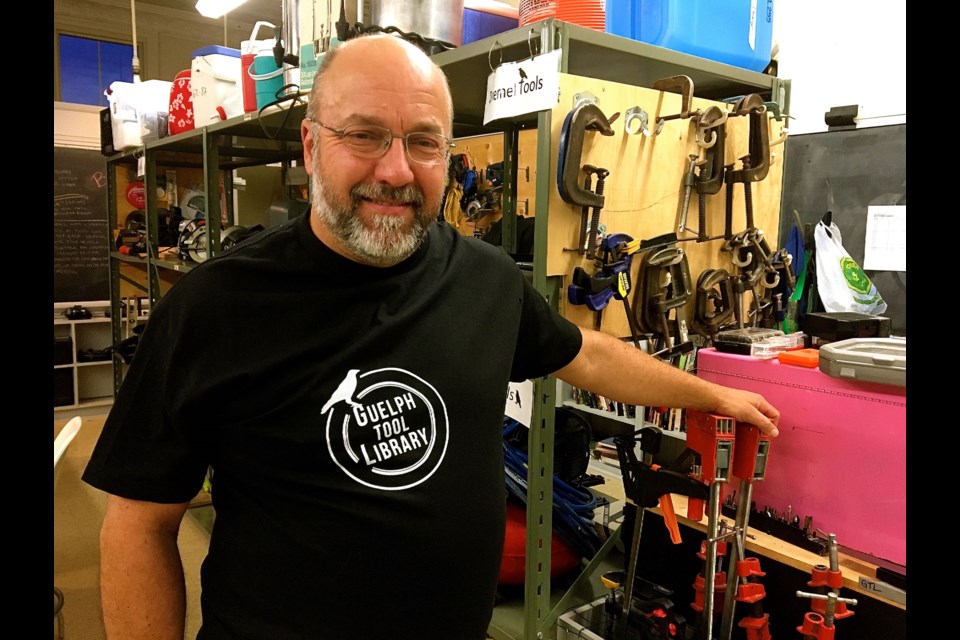Guelph Tool Library coordinator John Dennis has faith that, given the choice, well-informed people will adopt environmentally sustainable lifestyles and it is his Christian faith that helps him sustain that belief.
“I don’t make excuses for it,” said Dennis. “I will never be evangelical and push Christianity on people but what drives me internally is my core belief system.”
Dennis has been active in several social and environmental initiatives in the community over the years and was a recipient of the 2018 Mayors Award.
“I think it is important to be a part of the community, to help people, to give back,” he said. “One of the big drivers for me is climate change and how it is affecting us. I often think about the future and what I want to see when I look back 20 years from now. What did I do? How did I try to be an agent of change?”
Paying it forward is a family tradition.
“My parents did a lot of volunteering and they were great role models for me,” he said. “Both of my parents were really involved with the church and it has been a big part of my life. It gives me foundation.”
Dennis was born in Toronto in 1965 the youngest of three siblings. His oldest sister is an emergency room nurse and teacher in Toronto and his other sister is an Anglican minister in Barrie. He studied chemistry and microbiology at the University of Toronto
“I moved to Guelph 30 years ago right after I graduated from university,” said Dennis. “Mostly I moved here because my girlfriend Kim, who is now my wife, had a job in the area and I followed her here. I was lucky enough to get a job at the U of G in the vet college.”
He and Kim were married two years later and he went back to school to study health and safety at Ryerson University.
“I was one of the first graduates from the program there,” he said. “I got a bachelor of applied science in occupational health and safety and that is what I do professionally.”
He worked for a number of local companies such as Owens Corning, Polycon, GE Glegg and Conestoga-Rovers and Associates and for the past 15 years he has been a provincial health and safety inspector.
“I am a provincial offences officer, affectionately known as a POO,” he said. “My beat, if you will, is construction. So, if someone gets hurt or killed on a construction project in Hamilton or Halton I might be the person that gets called to investigate.”
In his spare time he has worked to reduce waste, protect the environment and eliminate poverty through a variety of initiatives including Living Better on Less, Habitat for Humanity, Urban Sugaring and Guelph Tool Library campaigns such as Sew North, Good Call, Repair Café, The Re-Purpose Festival and the Zero-Waste Festival.
He is a volunteer with the Green Party in Guelph-Eramosa and a member of Fair Vote Guelph.
“What we do as consumers does have an effect but really the government has to lead the change,” he said. “The government has to force changes. That will happen by the way people vote and the demands they put on their politicians.”
The Guelph Tool Library was launched three years ago as a project of Transition Guelph but since the beginning of August has been an independent organisation.
“We are in the process of creating a board and creating our bylaws,” said Dennis. “Our end goal is to become a charitable organisation.”
He credits fellow coordinator Susan Carey for coming up with the concept in response to an urban gardening campaign designed to help people grow their own food and harvest fruit from trees in the city.
“A lot of people told us they didn’t have the tools to garden or to do preserves so, we got a couple small grants to start us off and we focused on kitchen appliances and garden tools,” he said. “Almost immediately people asked about saws and drills so we expanded.”
The library located in Tytler Public School on Ontario Street collects donated tools and lends them to members who pay a $40 annual membership fee.
“We’ve just had our 5,000th loan and we have seen a huge jump up in our usage,” said Dennis. “We have just over 450 members.”
By recycling the tools they keep them out of landfills. It encourages people to repair things rather throw them away and to grow and preserve nutritious food locally for their families and community.
“The Tool Library is part of poverty elimination,” said Dennis. “We give people access to tools and appliances they normally wouldn’t have. There is a big community element to it. We are all friends doing it together and we have a good time doing it.”
It helps raise their members health and standard of living without increasing their commercial consumption.
“I think the most important thing is the clear and tangible impact it can have on climate change and the amount of greenhouse gases that are produced,” said Dennis. “We talk about how we are trying to get people to think about their consumerism – how they spend. We have this new slogan “Lending is the New Spending”
.png;w=120;h=80;mode=crop)

